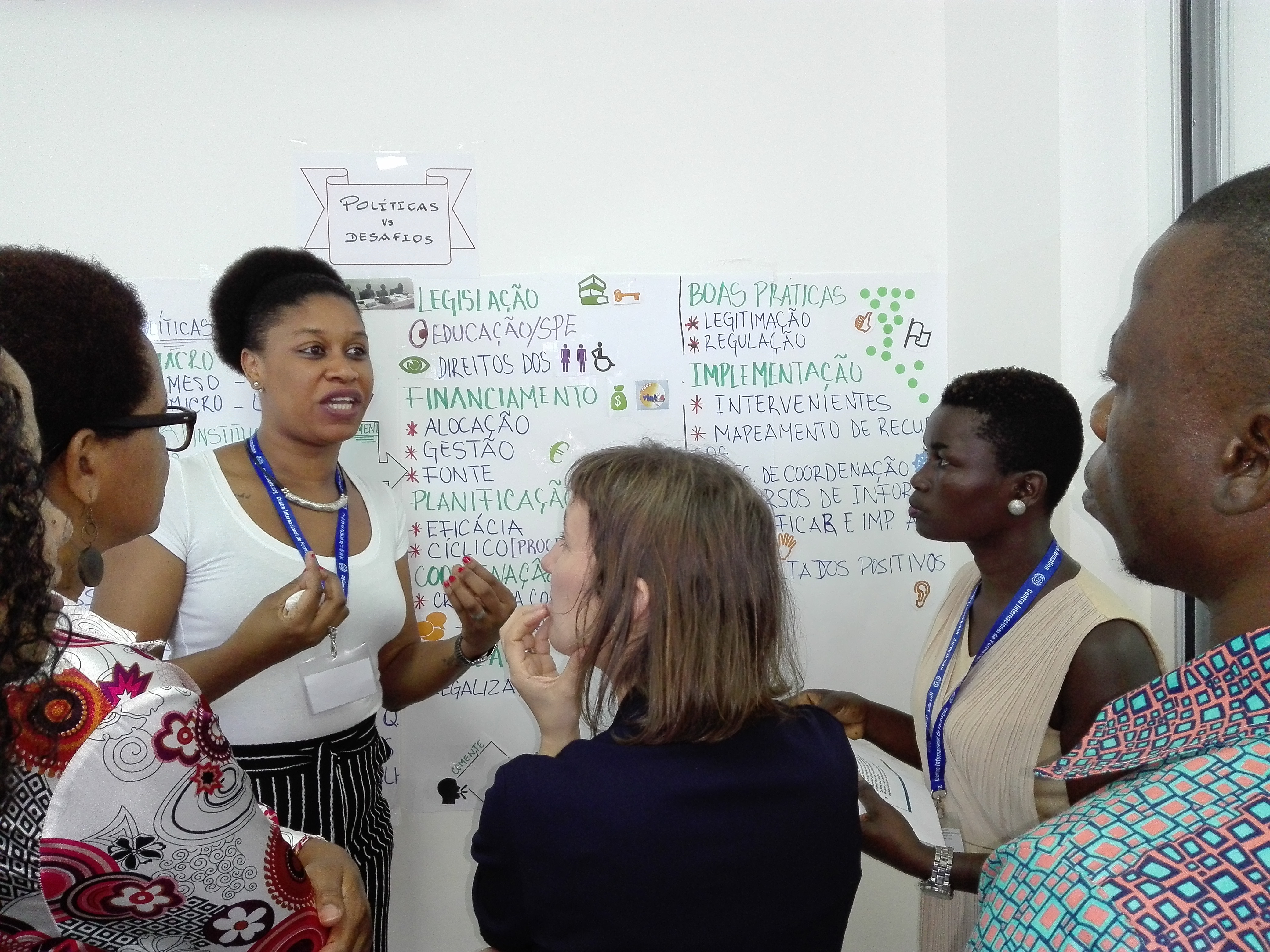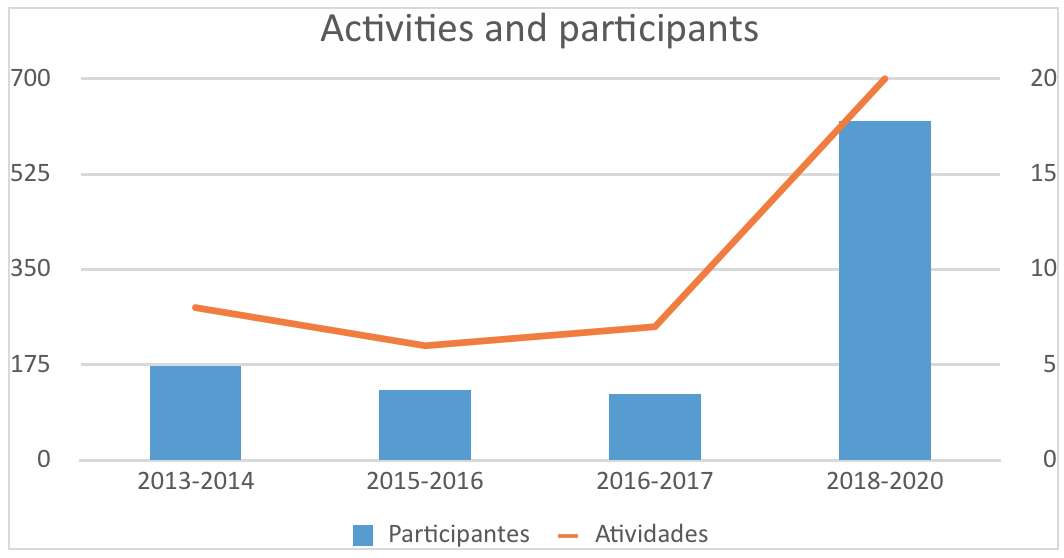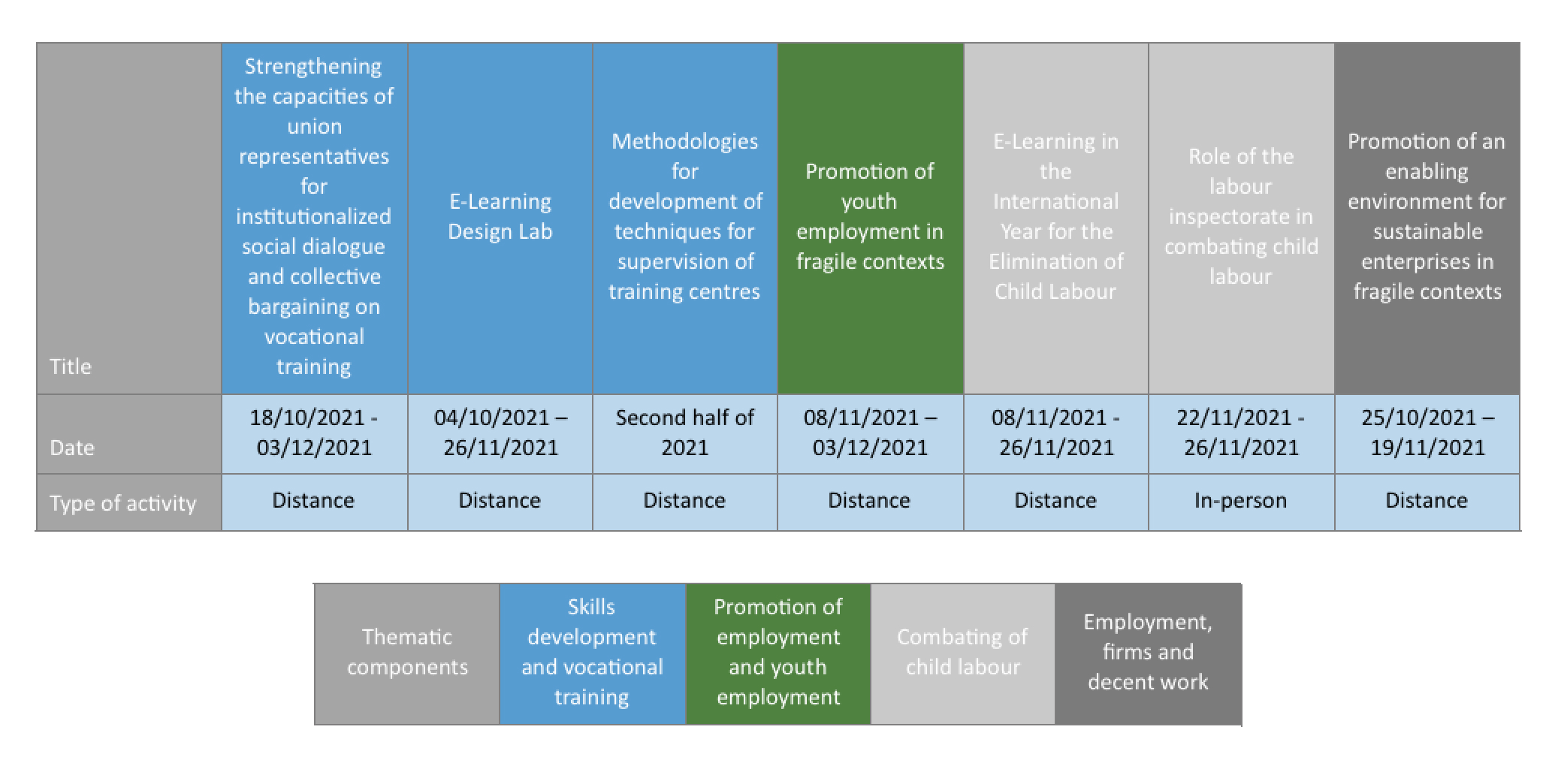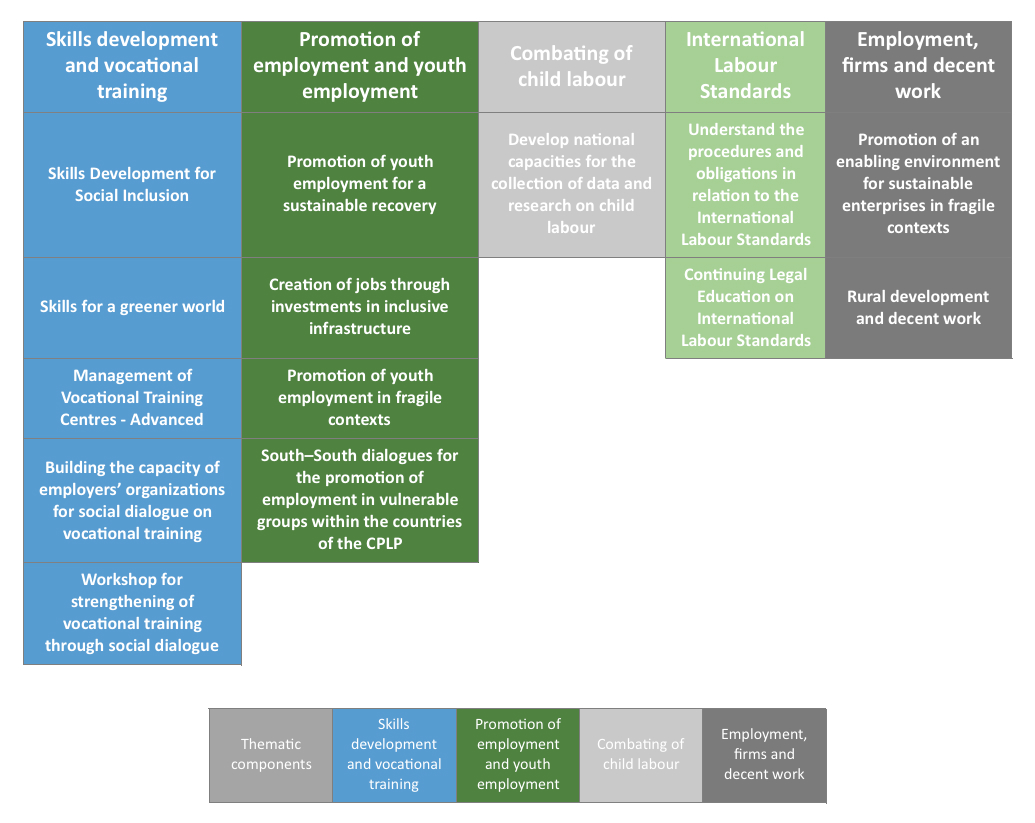Together for decent work in the Portuguese-speaking countries

Together for decent work in the Portuguese-speaking countries
An alliance to support the institutions of the CPLP countries in implementation of policies for the creation of more and better jobs and to increase employability.

The project
The IEFP/ITCILO training project aims to develop the capabilities of the institutions of the states of the CPLP in the design and implementation of policies and programmes aimed at the creation of more and better jobs and increased employability.
The training plans encompass training activities, mainly in the areas of employment promotion, skills development and vocational training, and other topics related to the Decent Work Programme that are priorities for the policy agendas of the countries of the CPLP, with special consideration of women, young people and disadvantaged groups.
ALL OF THE ACTIVITIES ARE IN PORTUGUESE
Participating countries
Angola, Brazil, Cape Verde, Guinea-Bissau, Equatorial Guinea, Mozambique, Portugal, Sao Tome and Principe and East Timor.

Objective
The overall objective of the training programme is broad and long-term, and thus, in order for it to be achieved, training initiatives are necessary at various levels and over time. The plans are conceived in such a way as to answer the needs for institutional capacity-building of the member States of the CPLP and of their selected institutions. The training activities are brought into harmony with the technical cooperation initiatives of the IEFP currently under way, and with the priorities of the ILO.
-
The project promotes and disseminates the Portuguese language as an important medium of communication among the countries of the CPLP and as an instrument of communication and work internationally.
-
We strongly foster network working among the Lusophone countries, offering a space for discussion and the sharing of best practices and cooperation on topics of employment and employability.

History
Carrying on the tradition of cooperation between the Government of Portugal and the ITCILO that began in 1993 with activities within the framework of vocational training and social protection for the Portuguese-speaking African countries (PALOPs), the Ministry of Labour, Solidarity and Social Security/Employment and Vocational Training Institute (IEFP) of Portugal, and the International Training Centre of the ILO (ITCILO), agreed in 2010 on cooperating in the implementation of training and apprenticeship programmes looking to develop the capacities of the institutions in the member States of the CPLP, on topics of decent work, employment, vocational training and sustainable development.
After several annual training programmes, in January 2015 implementation was launched of three-year training programmes, with short- and medium-term objectives and results, and activities that are strategically linked over the three project years. In 2021 the new three-year cycle began, with activities up to December 2023.
Since the beginning in the year 2010, 41 training activities have been offered in Portuguese taking in a total of 1045 trainees.

Activities, 2021-2023
The programme for 2021-2023 will be developed on the basis of the objectives set out by the project, of the training events and of the results of the previous programme (2013-2020), of the training priorities identified by the beneficiaries and of the priority development areas of the ILO, of the IEFP and of the Portuguese bilateral cooperation programme (PEC).
The focus for activities for the period from 2021 to 2023 combines three levels of capacity-building initiatives:
(a) at individual level (online, in-person and combined courses);
(b) at institutional level (advising vocational training institutions, development of training materials, support on distance training topics); and
(c) in terms of the system and environment where individuals and institutions interact (knowledge management platform and in-person event for the CPLP on vocational training).
The training programme courses are organized into five thematic components, with a total of 24 distance and in-person activities:
- Component 1 - Skills development and vocational training: eight activities;
- Component 2 - Promotion of employment and youth employment: five activities;
- Component 3 - Combating child labour: three activities;
- Component 4 - International Labour Standards: four activities;
- Component 5 - Employment, firms and decent work: five activities.
The bulk of the courses proposed, implemented in close collaboration with the recipient and partner institutions and with the IEFP itself, are training activities that have been “tailored” to the training needs of the CPLP countries.
Training methodology
In line with the “Turin Learning Approach” used by the International Training Centre of the ILO, the courses are extremely participative and make discussion possible to go into in greater depth, with knowledge dissemination and sharing between experts and participants. The activities rest on a combination of various learning methodologies, with alternation of presentations put on by recognized specialists on the subject, with interactive and participatory exercises and spaces for knowledge sharing and reflection, in which the participants are encouraged to share national experiences.
The distance courses are undertaken on the ITCILO platform for distance learning – e-Campus – in which the participants will get access to the course modules and to other learning resources: videos, exercises, complementary readings and thematic forums for the exchange of experience between colleagues and specialists.
To whom are the courses directed?
The training programme is essentially aimed at representatives of governmental institutions, workers’ and employers’ organizations, education and vocational training institutions and civil society institutions.
Certification
Following a satisfactory assessment in accompaniment of the course, the participants will receive a Certificate issued by the ITCILO.
Participation in the courses is free of charge for the institutions of the CPLP countries.
Given the limited number of places, the institutions and participants will be selected according to criteria of institutional and occupational profile, and territorial and gender equity.
Courses
2021

Strengthening the capacities of union representatives for institutionalized social dialogue and collective bargaining on vocational training:
Training activity with a broad thematic approach to vocational training, to include topics related to the International Labour Standards, governance and the financing of the vocational training institutions, public policies for employment and vocational training, collective bargaining and agreements on vocational training, among others. It is directed in particular to union representatives in the areas of institutionalized social dialogue for vocational training within the CPLP, and to the union leaders with responsibilities in sector- or enterprise-level collective bargaining with an interest in and potential for the incorporation of vocational training into collective agreements.
Learn more and register here >
E-Learning Design Lab
In this course, the participants will learn about the most recent developments on how to design a distance training initiative, by sharing, interacting and practising with a team of trainers and specialists. In the e-learning lab, the participants will acquire the knowledge and the tools that they need – in a practical, interactive and participatory manner – to design and offer distance training activities.
Learn more and register here >
Methodologies for development of techniques for supervision of training centres
The course is aimed at directors of vocational training centres, decision-makers and technical staff of the ministries responsible for the planning and implementation of vocational training (Ministries of Labour, Education and Finance), and representatives of national vocational training authorities – who through a collaborative action-oriented approach will create the relevant methodology to ensure the quality of the operations of their vocational training centres.
Learn more and register here >
Promotion of youth employment in fragile contexts
The course will provide a range of integrated approaches, tools, methodologies and real case studies of promotion of youth employment and of decent work in crisis situations, including armed conflicts, natural disasters, rapid environmental degradation and forced displacement of persons. It is targeted to a diverse audience with responsibility for matters related to fragility, resilience and promotion of youth employment in fragile contexts, specifically government officials, ILO social partners and development practitioners working in complex contexts (including natural disasters, armed conflicts, rapid environmental degradation and forced displacement of persons).
Learn more and register here >
E-Learning in the International Year for the Elimination of Child Labour (IYECL)
The objective of this course is to increase understanding concerning sustained eradication of child labour. The course will help to determine the actions to be undertaken on the occasion of the International Year for the Elimination of Child Labour, and beyond that, to pave the way for a world in which no child is subject to child labour or to exploitation. The course is designed for ILO constituents as well as representatives of the private sector, civil society and non-governmental organizations. The representatives of the CPLP States that might be considering the possibility of becoming pioneer countries in Alliance 8.7 are especially welcome.
Learn more and register here >
Role of the labour inspectorate in combating child labour
The course will provide knowledge and tools to aid the labour inspectorate in improving the effectiveness of its efforts for the elimination of child labour, focussing on the identification, prevention and remediation of cases of child labour, including new approaches to this important issue of human rights. Particular attention will be given to the planning and implementation of the interventions in labour inspection regarding child labour, taking into account the good practices that have arisen in this area within the countries of the CPLP.
Learn more and register here >
Promotion of an enabling environment for sustainable enterprises in fragile contexts
When a community faces catastrophes, violence, conflicts or emergencies, the capacity for survival of local businesses is a significant factor in the process of recovery. This course is aimed at providing an understanding of the tools and approaches for directing and contributing to reforms of the business environment in fragile areas, and a sound understanding of the functioning, methodology and activities of the ILO programme entitled “Enabling Environment for Sustainable Enterprises”.
Forum
Space for interaction between participants, experts and partner institutions for the sharing of opinions, knowledge and ideas and for the exchange of best practice and experiences.
Within this space, discussions will be initiated on various topics related to the topics of the courses. All project participants may participate, irrespective of the course taken.
The IEFP
The Employment and Vocational Training Institute (IEFP) is a public agency created in 1979, overseen by the Ministry of Labour, Solidarity and Social Security. It is responsible for implementation of the employment and vocational training policies defined and approved by the government. Within the context of its responsibilities, the IEFP also participates in coordination of the activities of technical cooperation undertaken with national and international organizations in the areas of employment and vocational training and rehabilitation.

